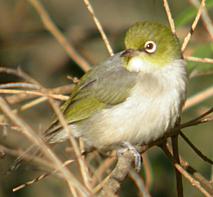Silvereye
|
|
| Silvereye | ||||||||||||||
|---|---|---|---|---|---|---|---|---|---|---|---|---|---|---|
 | ||||||||||||||
| Scientific classification | ||||||||||||||
| ||||||||||||||
| Binomial name | ||||||||||||||
| Zosterops lateralis (Latham, 1802) |
The Silvereye, White-eye or Wax-eye (Zosterops lateralis) is a very small passerine bird native to Australia but also found in New Zealand. It is common to abundant throughout the relatively fertile south-west and south-east parts of the continent (including Tasmania and the Bass Strait islands), and through the well-watered coastal zone of tropical Queensland, including Cape York Peninsula.
Silvereyes breed in spring and early summer, making a tiny cup of grass, spiderweb, and thistledown, suspended from a small tree or shrub, and laying 2 to 4 pale blue eggs. Once the young have fledged, Silvereyes gather into flocks and many migrate north during late summer, making their way north along the coast and ranges, foraging busily through the day with much calling and quick movement through the shrubbery, gradually working north, then flying long distances at night.
Most of the Tasmanian population crosses Bass Strait (an astonishing feat for 12 cm birds weighing only a few grams) and disperses into Victoria, New South Wales, and south-eastern Queensland. The populations of these areas tend to head further north, and the northern-most birds remain resident all year round. The Silvereye was first recorded in New Zealand in 1832 (its Maori name Tauhou, means "stranger"). It arrived in greater numbers in 1856, and it is assumed that a migrating flock was swept eastwards by a storm. Since there is no evidence that it was artificially introduced into New Zealand, it is classified as a native species there and consequently protected.
Silvereyes are omnivouous but have a particular fondness for fruit. Some orchardists, grape growers, and home gardeners regard them as a pest particularly as, being so small, Silvereyes simply ignore bird nets, popping in and out through the netting at will.
